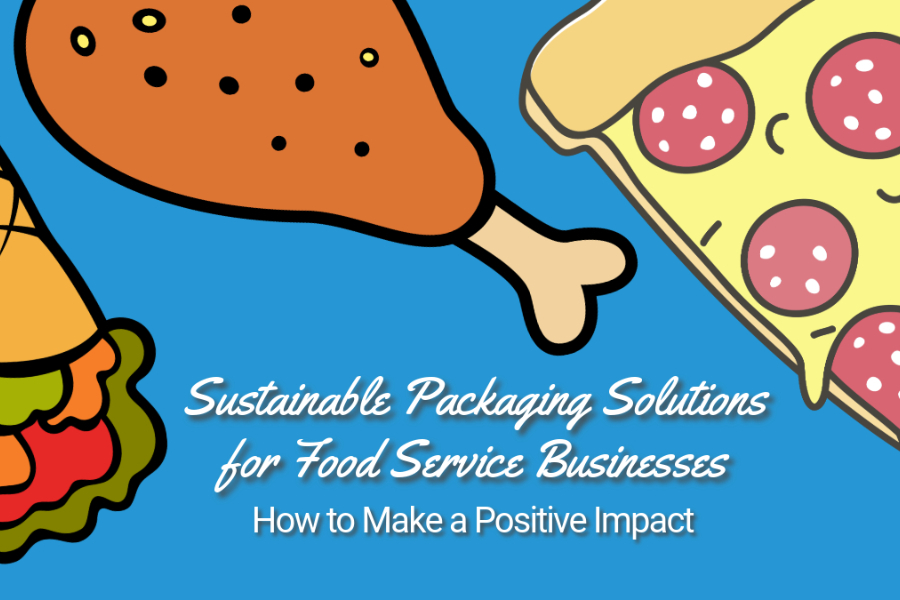By Erick NovaRestaurant supplies, Sustainability in the Packaging Industry
Sustainable Packaging Solutions for Restaurants & Food Service Businesses: How to Make a Positive Impact
As the demand for eco-friendly practices continues to rise, restaurants and food service businesses are increasingly looking for ways to reduce their environmental impact. One of the most effective ways to do this is by adopting sustainable packaging solutions. Sustainable packaging not only helps in preserving the environment but also aligns your business with the values of modern consumers who are more conscious about their ecological footprint. In this blog post, we’ll explore the concept of sustainable packaging, its benefits, and specific solutions tailored to the needs of restaurants and food service businesses.
What is Sustainable Packaging?
Sustainable packaging refers to the use of materials and manufacturing processes that have minimal impact on the environment. The goal is to reduce the amount of waste generated, conserve resources, and create packaging that can be reused, recycled, or composted. Sustainable packaging typically adheres to three main principles:
- Reduce: Minimizing the amount of material used in packaging to lessen waste.
- Reuse: Designing packaging that can be reused multiple times before disposal.
- Recycle: Using materials that can be recycled, keeping them out of landfills.
For restaurants and food service businesses, sustainable packaging means opting for materials that are safe for food contact, environmentally friendly, and cost-effective. From takeout containers to food wrappers, every packaging choice can contribute to a more sustainable operation.
The Benefits of Sustainable Packaging for Restaurants and Food Service Businesses
1. Environmental Impact: One of the most significant advantages of sustainable packaging is its positive impact on the environment. Traditional packaging materials, such as plastic and Styrofoam, contribute to pollution and take centuries to decompose. In contrast, sustainable packaging materials, like compostable and recyclable options, break down more quickly and reduce the burden on landfills. By choosing sustainable packaging, your restaurant can actively participate in reducing waste and promoting a healthier planet.
2. Enhanced Brand Image: Consumers are increasingly choosing to support businesses that demonstrate a commitment to sustainability. By using eco-friendly packaging, your restaurant can enhance its brand image and appeal to a growing segment of environmentally conscious customers. This can lead to increased customer loyalty and positive word-of-mouth marketing, as diners are more likely to recommend a restaurant that aligns with their values.
3. Cost Savings: While sustainable packaging may have a higher upfront cost, it can lead to long-term savings. For example, reducing the amount of packaging material used can lower shipping and storage costs. Additionally, many municipalities offer incentives or lower waste disposal fees for businesses that adopt environmentally friendly practices. Over time, the cost savings can offset the initial investment in sustainable packaging.
4. Compliance and Regulations: Many regions are implementing regulations to reduce plastic waste and promote the use of sustainable materials. By transitioning to sustainable packaging now, your restaurant can stay ahead of these regulations and avoid potential fines or penalties. Moreover, obtaining certifications for using sustainable packaging, such as FSC (Forest Stewardship Council) certification for paper products, can further boost your restaurant’s credibility.
Types of Sustainable Packaging Solutions
When it comes to sustainable packaging, there are several options available that are particularly well-suited for restaurants and food service businesses. Here are some of the top choices:
1. Recyclable Gable Boxes
Gable boxes are a versatile and popular choice for takeout and food delivery. These boxes are made from recyclable materials, making them an eco-friendly option for packaging. They are designed to be sturdy, easy to carry, and can hold a variety of food items securely. Whether you’re packaging sandwiches, baked goods, or a full meal, recyclable gable boxes provide a sustainable solution that doesn’t compromise on functionality or convenience.
Key Features:
- Made from recyclable paperboard.
- Ideal for takeout and delivery.
- Customizable with your restaurant’s branding.
2. Bagasse Compostable Takeout Boxes
Bagasse compostable takeout boxes are an excellent alternative to traditional plastic or Styrofoam containers. Bagasse is a byproduct of sugarcane processing, making it a renewable resource. These takeout boxes are not only compostable but also microwave-safe, making them convenient for both restaurants and customers. They can break down in composting facilities within 30 to 90 days, leaving behind no harmful residue.
Key Features:
- Made from 100% compostable bagasse.
- Sturdy and microwave-safe.
- Suitable for hot and cold foods.
3. Reusable and Microwavable Plastic Containers
For restaurants offering meal prep services or bulk food orders, reusable and microwavable plastic containers are a practical and sustainable option. These containers are designed for repeated use, reducing the need for single-use packaging. They are made from durable, food-grade plastic that is safe for microwave use, allowing customers to reheat their meals conveniently. Additionally, these containers can be washed and reused multiple times, making them an eco-friendly choice that also adds value for your customers.
Key Features:
- Reusable and durable.
- Microwave and dishwasher-safe.
- Ideal for meal prep and bulk orders.
Implementing Sustainable Packaging in Your Restaurant
Adopting sustainable packaging requires a thoughtful approach to ensure it aligns with your business operations and customer needs. Here are some steps to guide your transition:
1. Assess Your Current Packaging: Begin by evaluating the packaging materials you currently use. Identify areas where you can reduce waste or switch to more sustainable options. For instance, consider replacing plastic bags with recyclable paper bags or opting for compostable utensils instead of plastic ones.
2. Choose the Right Materials: Select packaging materials that meet the specific needs of your restaurant. Consider the type of food you serve, the temperature requirements, and the distance for delivery. For example, if your restaurant specializes in hot meals, compostable takeout boxes that can withstand high temperatures would be ideal.
3. Collaborate with Suppliers: Work closely with your packaging suppliers to source sustainable materials. Look for suppliers who share your commitment to sustainability and can provide eco-friendly options at competitive prices. Additionally, inquire about bulk discounts or customized packaging solutions that can help reduce costs.
4. Educate Your Team and Customers: It’s essential to educate both your staff and customers about the benefits of sustainable packaging. Train your team on how to properly use and dispose of the new packaging materials. Similarly, communicate with your customers through in-store signage, social media, or your website, explaining the positive impact of your sustainable packaging choices.
Overcoming Challenges in Sustainable Packaging
While the benefits of sustainable packaging are clear, there are some challenges that restaurants may face when making the switch. Here are a few common challenges and how to address them:
1. Higher Upfront Costs: Sustainable packaging materials can be more expensive than traditional options. To manage costs, start by transitioning to sustainable packaging for a few key items and gradually expand as your budget allows. You can also explore cost-sharing options with suppliers or consider passing on a small surcharge to customers who opt for eco-friendly packaging.
2. Supply Chain Disruptions: Sourcing sustainable materials can sometimes be challenging due to supply chain disruptions or limited availability. To mitigate this risk, establish relationships with multiple suppliers and maintain a buffer stock of essential packaging materials. Staying flexible and adaptable will help ensure that your restaurant can continue to operate smoothly.
3. Educating Customers: Not all customers may be aware of the benefits of sustainable packaging, and some may resist change. To overcome this, use clear messaging to highlight the environmental advantages and long-term benefits. Offering incentives, such as discounts for customers who bring their own reusable containers, can also encourage adoption.
Conclusion
Sustainable packaging is more than just a trend; it’s a critical component of running a responsible and forward-thinking restaurant. By choosing eco-friendly packaging solutions like recyclable gable boxes, bagasse compostable takeout boxes, and reusable microwavable plastic containers, your restaurant can reduce its environmental impact, enhance its brand image, and meet the expectations of today’s conscious consumers. Now is the time to take the first step towards a more sustainable future for your business and the planet.
Explore Splash Packaging’s range of sustainable packaging options to find the perfect solution for your restaurant. Contact our team today for personalized recommendations and support.
Related Posts
See how Splash Packaging can elevate your brand with exceptional quality & style.
Newsletter sign up
Recent Posts
- How to Package Baked Goods to Maximize Freshness & Presentation
- The Best Ways to Package Homemade Jams & Jellies for Gifts or Sale
- The Best Paper Shopping Bag for Takeout: Why Restaurants Choose the EcoPlus™ 10 x 10 x 10 Takeout Bag
- E-Commerce Trends for 2025: What Online Retailers Need to Know
- Paper vs. Plastic Bags: Which Is the Best Choice for Your Business?







